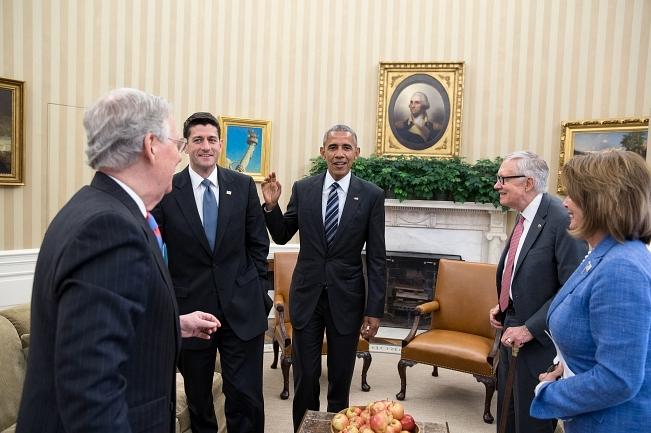After an Oval Office meeting with top Senate and House leaders yesterday, President Barack Obama said he was hopeful that Zika funding would be part of an agreement to continue funding the government, a step Congress needs to take before it adjourns again at the end of the month.
In other developments, Florida reported 14 more local Zika illnesses yesterday and today and new details were published about the investigation into an unusual Zika case that surfaced in Utah in July, when an elderly man apparently passed the virus to his son, who was one of his caregivers.
Funding progress cited
The meeting included House and Senate leaders from both parties, and afterward, Obama told reporters that he was encouraged by work that's being done, according to an Associated Press (AP) report.
Ahead of the White House meeting, Sen. Mitch McConnell, R-Ky., said in a statement that members on both sides have been working on an agreement to responsibly fund the government and have already made a lot of progress. "I expect to move forward this week on a continuing resolution through December 9 at last year's enacted levels and include funds for Zika control and our veterans," he said.
Sen. Harry Reid, D-Nev., said he was cautiously optimistic that the Senate would complete its work on Zika and the continuing resolution to temporarily fund the government. "But it can happen only if Republicans are resolved to not play politics with these important issues," he said in a statement.
At a press briefing before the White House meeting, Obama's press secretary, Josh Earnest, addressed a question about talk that Republican lawmakers might include a Zika bill without Planned Parenthood riders that would pay for funding with cuts to other programs. He said Obama forwarded the original funding proposal, based on input from public health experts, 7 months ago and said the legislation has been bogged down in Planned Parenthood and other controversial riders.
"So the President is, once again, going to make the case that that's exactly what Republicans in Congress should do," Earnest said. "And again, I think it's an open question about whether or not they'll fulfill their responsibilities. Hopefully they will."
Health officials, professional groups urge funding
At a media telebriefing today, meanwhile, federal health officials and leaders from two doctor's groups pushed again for Congress to approve Zika funding, with money running out amid local illnesses and affected pregnancies increasing in the continental United States and its territories.
Beth Bell, MD, MPH, director of the National Center for Emerging and Zoonotic Diseases at the Centers for Disease Control and Prevention (CDC), said Zika funding that had been earmarked from repurposed Ebola response money is essentially all spent. She warned that critical public health may not be able to move forward, such as mosquito surveillance and multiyear studies on Zika-related birth defects. She said the funding lapse could cancel vaccine work and slow the developments of new Zika tests.
"We hope they will do the right thing," Bell said of lawmakers.
Thomas Gellhaus, MD, president of the American Congress of Obstetricians and Gynecologists, said developing better and faster tests for Zika virus is an urgent need, because the method for confirming infections is often complex, with pregnant women often having to wait several weeks for results, depending on where they live.
He also said women of childbearing age need options for preventing pregnancy, in light of the Zika threat. "We don't know how to prevent Zika, but we do know how to prevent unplanned pregnancy. We need to act now and act together."
Karen Remley, MD, executive director and chief executive officer of the American Academy of Pediatrics, said babies born with congenital Zika virus infections need extensive screening and access to care in the short term, and she urged Congress to keep in mind that affected children and their families will need comprehensive support in the years ahead, given that the estimated healthcare cost per Zika-affected child is about $10 million over his or her lifetime.
"This is a major public health issue, and adequate funding is very important," she said.
Local Florida cases hit 70
In related news, the number of local Zika cases in Florida continues to climb, with the Florida Department of Health (Florida Health) reporting 14 more yesterday and today. Three patients are from the Wynwood transmission area, including two who were sick in late July, but officials were waiting on antibody tests to rule out other mosquito-borne illnesses such as dengue and chikungunya. Another six infections are linked to the active transmission area in Miami Beach.
Four new patients are Miami-Dade County residents, and health officials are still investigating where they were exposed to the virus. One of the patients is a Palm Beach County resident, apparently representing the fourth local case from that area, and efforts are under way to pinpoint where he or she was infected.
The new cases lift Florida's local case total to 70. Yesterday the agency reported seven more travel-related cases, including the first in Nassau County. The state now has 621 imported Zika cases.
In related developments and as if to underscore the concerns health officials voiced today, pregnant women in Miami-Dade County are facing major delays in learning the results of Zika tests, which the state is offering for free, with a large number of women taking them up on the offer, the New York Times reported yesterday.
Florida announced the testing offer on Aug 3, and according to the Times, many women are waiting at least 4 or 5 weeks for their test results. Sources linked the delays to a variety of reasons: complicated testing protocols, bureaucratic problems, and lack of resources.
Doctors worry that the delays are adding to the stress of pregnancies and complicating decisions on carrying or terminating pregnancies, according to the Times.
Florida is monitoring 86 pregnant women who are infected with Zika virus.
Utah case hints at body fluid risks in severe infections
The Utah case involved an elderly man with underlying health conditions who contracted a Zika infection during travel abroad. The illness in the man's son was unusual, because it didn't involve sexual transmission, triggering an intense investigation by Utah health officials and the CDC into how the younger man was exposed and if any others were infected or if the virus was circulating in local mosquito populations.
The team published the preliminary results of their investigation today in an early online edition of Morbidity and Mortality Weekly Report (MMWR).
According to the report, the son had cared for his father for several days, and a blood sample from the elderly man obtained 2 days before he died from septic shock revealed Zika viral load that was 100,000 times higher than normal for infected patients.
Nineteen family contacts who lived in the same household or had contact with the man's body fluids were interviewed and tested, including 13 who—like the son—had hugged the man and kissed his face. The son had assisted hospital staff with the man's care on one occasion, but didn't have direct contact with his stool. No other Zika infections were detected in any of the other family contacts.
Healthcare workers (86) and residents of 238 households within a 200-meter radius of the two homes the older man stayed in before he died were interviewed and offered Zika testing. Antibody testing is under way for all who submitted blood samples, and urine samples were collected for anyone reporting Zika-like symptoms in the 14 days before their interviews. As of Aug 22, no other Zika infections have been detected.
Mosquito surveillance near the two homes is under way, and adult mosquitoes are being analyzed and tested for Zika virus. So far no Aedes aegypti or Aedes albopictus mosquitoes—the two types known to carry the virus—have been identified.
The investigators said though it's not clear how the younger man was infected, he had close contact with his father while the elder man's viral load was very high.
The researchers warned that family contacts should be aware that blood and other body fluids of severely ill Zika infections might be infectious. They also said the case underscores the importance of contact precautions for health providers working with all patients, including those who have possible Zika virus infection.
See also:
Sep 12 AP story
Sep 12 Mitch McConnell statement
Sep 12 Harry Reid statement
Sep 12 White House briefing transcript
Sep 12 Florida Health daily Zika update
Sep 13 Florida Health daily Zika update
Sep 12 New York Times story
Sep 13 MMWR report





















